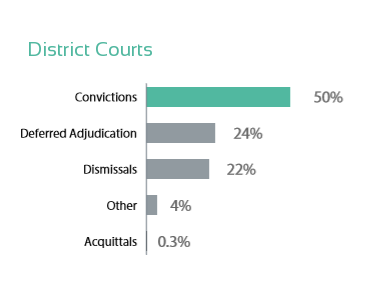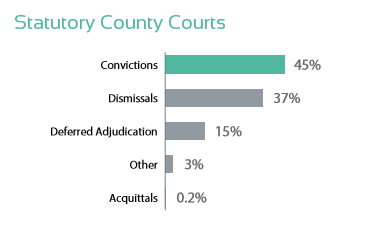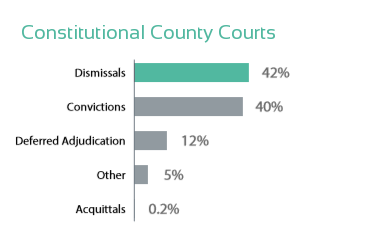Texas may be known as a crime and punishment state, but you might be surprised in how often the prosecutor and courts agree to defer the adjudication of a defendant. What is deferred adjudication? It’s a process where a defendant agrees to plead guilty, but the court waits to accept the guilty plea. In these cases, the defendant is then given a set of conditions they are required to meet. As long as they meet these criteria, the judge will dismiss the case against the defendant instead of accepting the guilty plea.
Deferred adjudication has its drawbacks; if a defendant is found to have violated their conditions they will be found guilty immediately and move directly to the sentencing phase. Despite this risk, deferred adjudications in Texas are quite common. Below, you will find a breakdown of how frequently they occur in each type of Texas courtroom based on figures provided by the State of Texas.
District Courts
In Texas district courts, more than 94% of all convictions end in a guilty plea. A good number of those result from a deferred adjudication agreement between the prosecutor and the defendant. Out of all district court cases in 2018, nearly 1 in 4 resulted in deferred adjudication.

Statutory County Courts
The results in the statutory county courts are quite different. Unlike district courts, 37% of cases in statutory county courts are ultimately dismissed. This significantly higher rate of dismissal by prosecuting attorneys conversely led to only 15% of cases ending in deferred adjudication.
Constitutional County Courts
A similar trend can be found with constitutional county courts; a slight plurality of those cases ended in dismissal by the prosecutor. Altogether, only 12% of all cases in constitutional county courts ended in a deferred judgment in 2018.
Other Common Instances of Deferred Disposition
While the courts listed above are the primary criminal courts in the State of Texas, there are other venues that make great use of deferred dispositions or prosecution. For example, many juvenile courts will use a form of deferred prosecution that results in the juvenile offender avoiding prosecution entirely if they meet certain conditions.
Deferred dispositions are especially popular in traffic court, where nearly half of all speeding tickets and traffic violations end with some form of a deferred disposition.





